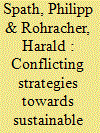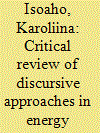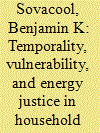|
|
|
Sort Order |
|
|
|
Items / Page
|
|
|
|
|
|
|
| Srl | Item |
| 1 |
ID:
137721


|
|
|
|
|
| Summary/Abstract |
Approaches to ‘sustainability transitions’ stress the possibility of aligning actors around a shared vision of the future, e.g. at the scale of a city. Empirical accounts reveal how difficult such coordination often is due to contradictory views involved. How can we better understand related processes of searching and negotiation? What does this mean for the organization of decision making processes regarding long-term infrastructural change? We analyze a conflict which erupted in Freiburg, Germany when two strategies of reducing environmental impacts of space heating were to be applied in the Vauban ‘model district’: A) Efficient co-generation of heat and power (CHP) combined with district heating systems (DHS), and B) Reducing heat demand by low-energy designs and ambitious energy standards (‘passive house standard’). In order to understand the politics of infrastructure development, we unravel 1) enabling factors and driving forces of the conflict, 2) normative content of opposing viewpoints, 3) resources tapped into for settling the disagreement, and 4) the institutional setup of such decision making about energy policy priorities in the municipality. We reflect on implications of such a perspective on how policies and how governance arrangements should ideally be shaped and take a brief outlook on further research needed.
|
|
|
|
|
|
|
|
|
|
|
|
|
|
|
|
| 2 |
ID:
188559


|
|
|
|
|
| Summary/Abstract |
Load management is the practice of adjusting demand in an electricity system through remote control of—or incentives to operate—grid-edge technologies in alignment with system goals. Although load management functions as a distributed energy resource (DER) and can play a critical role in cost-effective deployment of renewable energy toward economy-wide deep decarbonization, there has been little energy transitions research on how electric grid actors initiate and manage DER deployments over time. We use interviews and archival research to compare case studies of electric cooperatives in the United States, tracing how cooperatives deployed more than 600,000 load management devices over 70 years. Using polycentricism as a frame, we find that DER deployments comprise common pool resources that are strategically created and negotiated across scales by different centers of decision-making over time. Our findings rebut the assumption that DER deployments are solely the result of policies or markets, showing that DER deployments are instead polycentric acts of cooperation and competition. DER deployments require diverse intermediaries within and across levels of deployment, from policy to users, over many years. We show that polycentric governance that builds vertical coordination across local and regional actors can support broad, deep, and distributed energy transition.
|
|
|
|
|
|
|
|
|
|
|
|
|
|
|
|
| 3 |
ID:
166389


|
|
|
|
|
| Summary/Abstract |
This article critically reviews the use of discursive approaches in studies of sustainable energy transitions. The review is motivated by calls to further incorporate social scientific methodologies into energy research and assess their contribution to policy. We strive to answer three questions: (1) which discursive approaches have been used to study sustainable energy transitions; (2) what thematic topics and issue areas have been covered and (3) what is the added value of discursive research designs? Our analysis is based on a review of 77 articles from the years 2004–2016. Our findings show that discursive approaches were mostly used to analyse institutional change and policy strategies at the national level and to examine energy choices through political ideology and the perceptions of publics. Nuclear power received most coverage, while renewable energy technologies were mainly studied through conflicts and opposition. We demonstrate discursive research designs to examine four distinct policy areas and discuss the added value of these approaches for energy policy and research. Discursive methodologies enable scholars to enrich policy discussions through accounting for transitions as complex and dynamic processes of change.
|
|
|
|
|
|
|
|
|
|
|
|
|
|
|
|
| 4 |
ID:
178835


|
|
|
|
|
| Summary/Abstract |
In this empirical study, we explore the user acceptance of smart home technologies by asking: How do people perceive their opportunities and drawbacks? What factors shape their perceptions? What implications does this have for future energy savings, sustainability, and policy? Based on a mixed methods approach involving three focus groups (N = 18) and a nationally representative survey of adults (N = 1032) in the United Kingdom, we explore the demographics, preferences, and risks of smart home technology. We do this via the lenses of knowledge and adoption; energy and climate sustainability; and vulnerability and exclusion. We explore how different classes of people—adopters versus non-adopters, high-income versus low-income, women and men, old versus young—support or oppose smart home technologies, have different degrees of knowledge and misperceptions, and reveal very different perceptions about the practices enabled by smart homes. In doing so, we show at times compelling links between smart homes and energy consumption, and possible negative impacts to poverty, inclusion, and empowerment.
|
|
|
|
|
|
|
|
|
|
|
|
|
|
|
|
| 5 |
ID:
166356


|
|
|
|
|
| Summary/Abstract |
Decarbonisation and innovation will change the affordability of different domestic energy services. This has the potential to alleviate vulnerability to fuel poverty, but it could create new injustices unless the risks are preempted and actively mitigated. In this paper, we ask: In what ways can emerging low-carbon innovations at the household scale complement, and complicate, achieving energy justice objectives? Drawing from four empirical case studies in the United Kingdom, the paper highlights different risks that come from different types of innovation required to tackle different decarbonisation challenges. More specifically, it assesses four particular household innovations—energy service contracts, electric vehicles, solar photovoltaic (PV) panels, and low carbon heating—selected for their fit with a typology of incremental vs. radical technology and modest vs. substantial changes in user practices. It shows how in each case, such innovations come with a collection of opportunities but also threats. In doing so, the paper seeks to unveil the “political economy” of low-carbon innovations, identifying particular tensions alongside who wins and who loses, as well as the scope and temporality of those consequences.
|
|
|
|
|
|
|
|
|
|
|
|
|
|
|
|
|
|
|
|
|